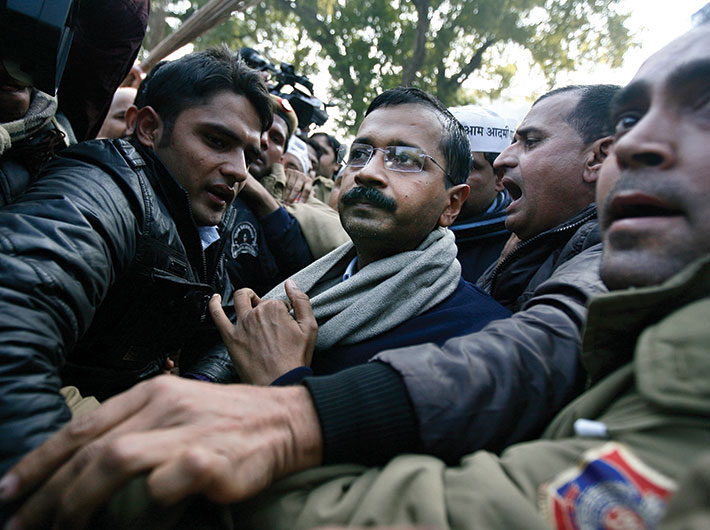The Delhi chief minister is trying to create disorder to create an order of his own vision which is more of a statist than anarchist.
Anarchy is order, whereas government is civil war. Such a differentiation between anarchy and government, as illustrated in the Anarchist Manifesto in 1850, appears more real than an academic formulation in today’s India. With Delhi chief minister Arvind Kejriwal proclaiming himself to be an anarchist, the transition from order to disorder is quite palpable.
Kejriwal is neither the first chief minister to raise a banner of revolt against an autocratic centre nor would he be the last. He conformed to the pattern of chief ministers who took on the centre in their own way – since the unconstitutional sacking of the communist regime in Kerala in 1959. Of late the chief ministers of Gujarat, West Bengal, Odisha and Bihar have been known for using every forum to run down the union government.
But Kejriwal is still an exception for many reasons. He is the first self-styled anarchist who is trying to enforce a disorder through the tool of governance. This contradicts the ideal state of anarchy as prescribed in the manifesto. Here also he reinvents himself as a neo-anarchist whose political objective of creating a just social order has to be attained by acquiring the state power.
Look at the issues on which Kejriwal laid siege to North and South Blocks, the ultimate seat of Indian state on Raisina Hill, and threatened to disrupt even the republic day function. He demanded that the Delhi Police be accountable to him. Kejriwal was particularly irked by the manner in which the police snubbed two of his ministers and refused to kowtow to their diktats which were patently illegal. Obviously Kejriwal’s grouse was his inability to lord over the Delhi Police as an undisputed ruler of the capital.
But he successfully tossed the issue over to the public domain by mobilising people for demonstration against the police high-handedness and corruption. Anybody slightly aware of statecraft would testify that the police have always been bearing the brunt of people’s anger against the state as they are the visible symbol of the state authority. Kejriwal cleverly used the pretext of mobilising public opinion to attain his political objective. His formulations are unusual and strategies quite subversive.
Yet he appears extremely fond of pelf and perks of power minus its ostentatious display. He still looks for a suitable official residence as the chief minister but tries to find an endorsement for it from people. But is he really so much bothered by public opinion? The question begs an answer as Kejriwal is capable of defying any straitjacket definition for him.
For instance, shortly after his swearing in, he asked residents of Delhi to conduct sting operations against corrupt officials if they demand bribe. But he acted like an archetypal politician when some of his colleagues were caught in sting operations purportedly making some unacceptable demands. In this case, he was not so much bothered about public opinion as he was about keeping his flock together before the Delhi assembly elections. A past scrutiny of his political conduct would bear this out that Kejriwal has been using government and public opinion shrewdly to sharpen his strategies.
Though the hypocrisy of his political conduct is partly exposed, it would be unfair to say that Kejriwal has lost his charm among people. At times, he demonstrates a streak of anarchism by hitting the streets and taking steps which are considered politically suicidal. In some of these cases, the issues raised by him pertain to the common people who seem to have been totally ignored in the ongoing political discourse.
He has been carefully cultivating the image of a leader who is identified more with the rising neo-middle class than the traditional middle class which still retains faith in the constitutional process.
There is little doubt that Kejriwal has calibrated his strategies successfully to attain his goal. But there is an inherent risk in running with the hare and hunting with the hound. He is trying to create disorder to create an order of his own vision which is more of a statist than anarchist. The sooner he unravels his political goal the better it would be for him and for people who put faith in him. If he continues with ambiguity, his position would soon become quite untenable.
(This story appeared in the January 16-31, 2014 print issue)



